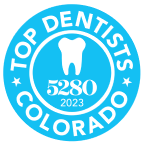 Bruxism, also known as teeth grinding, affects millions of children and adults across the country. Two of the most common causes of teeth grinding are stress and anxiety. When the worries of the day spill over into your sleep, the body may react by grinding the teeth. Because this happens at night, bruxism often goes completely unnoticed.
Bruxism, also known as teeth grinding, affects millions of children and adults across the country. Two of the most common causes of teeth grinding are stress and anxiety. When the worries of the day spill over into your sleep, the body may react by grinding the teeth. Because this happens at night, bruxism often goes completely unnoticed.
Other causes of bruxism include taking certain medications, sleep disorders, and lifestyle choices.
Continue reading to learn about the dangers of teeth grinding and how it can be treated.
The Negative Effects of Teeth Grinding
Bruxism affects much more than just your teeth; it can have serious negative impacts on all aspects of your health and life. Here are some indications that you might suffer from teeth grinding:
- Dull headaches in the morning
- Facial pain and swelling
- Feeling tired throughout the day
- Dental sensitivity
- Jaw stiffness
- Fractured teeth
- Damaged fillings
- Popping or clicking in the jaw
- Neck stiffness
As you can see, bruxism has serious side effects. Therefore, it should be taken seriously. Don’t let teeth grinding rule your life and keep you from living as fully and freely as you should!
If you or your child is experiencing any of these symptoms, schedule an appointment with your dentist as soon as possible.
Stop Teeth Grinding ASAP
There’s more than one way to treat teeth grinding; here are some of the most effective ones:
Reduce caffeine
Caffeine largely contributes to feelings of anxiety and stress which often lead to teeth grinding. We often recommend that patients only drink one caffeinated beverage in the morning or none at all. It is especially important for people with bruxism to stop drinking caffeine in the latter part of the day.
Exercise regularly
Bruxism could also be linked to an excess amount of energy in the body. Be sure to exercise at least three times a week. Most doctors also recommend that patients get in 10,000 steps per day. This helps expend your energy AND reduce stress and anxiety.
Learn relaxation techniques
Teeth grinding and TMJ disorder are often connected. These indicate that the jaw isn’t working properly. To help relieve some of the pain, inflammation, and stiffness, jaw relaxation techniques and exercises could be helpful.
Healthline.com has an excellent article outlining several jaw exercises, but your dentist may have specific recommendations for your situation.
Custom mouthguard
To protect your teeth while sleeping, your dentist may recommend a custom mouthguard. These are made just for your teeth, so the mouthguard fits perfectly over your top and bottom arches.
Although the goal is to stop the teeth grinding altogether, a custom mouthguard will protect your teeth from wear and damage while you and your dentist find and treat the root cause of the problem.
Orthodontics
If bruxism is caused by a bite disorder or dental misalignment, orthodontics could be the solution! The dentist may recommend Invisalign® clear aligners or traditional braces. Perfectly aligned teeth and jaws tend to be much less likely to suffer from bruxism.
Teeth Grinding Treatment in Denver
Bruxism should never go untreated. If you are experiencing symptoms of teeth grinding, contact our friendly dental team in downtown Denver today. Our expert dentists are prepared to help you find the pain relief you’ve been searching for so you can live a more fulfilling life.
Call (303) 534-2626 to schedule your initial consultation.

